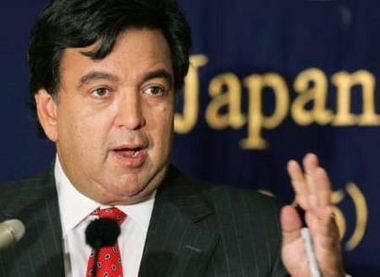|
North Korea would accept IAEA visit, US official
(AFP)
Updated: 2005-10-21 15:28
North Korea would accept a visit by officials from the UN nuclear watchdog,
whose inspectors were kicked out almost three years ago, US politician Bill
Richardson has said after a visit to the country.
Pyongyang also reaffirmed its commitment to rejoining the Non-Proliferation
Treaty and returning unconditionally to six-nation talks on its nuclear program
next month, he told journalists in Tokyo.
North Korea suspended its membership in the nuclear NPT in 1993 and placed
limitations on International Atomic Energy Agency (IAEA) inspections. It
withdrew from the treaty altogether in December 2002 and kicked out inspectors.

New Mexico States Governor Bill Richardson
speaks to reporters during a news conference at the Foreign Correspondents
Club of Japan in Tokyo October 21,
2005.[Reuters] | Richardson, now governor of the US state of New Mexico, came to Tokyo after a
four-day tour of North Korea where he met top officials including Kim Yong-Nam
for their third meeting.
"They ... indicated they would at an appropriate time invite IAEA officials,
including (director) Mohamed ElBaradei, to North Korea," he said.
The officials "reaffirmed their commitment to rejoining the Non-Proliferation
Treaty, also adhering to IAEA safeguards," said the former energy secretary and
UN ambassador under former US president Bill Clinton.
He said North Korean officials agreed to return to six-party talks in
November "unconditionally".
North Korea, South Korea, China, Japan, Russia, and the United States
resumed the talks on scrapping North Korea's nuclear arsenal in Beijing in
September. A next round is expected in the Chinese capital in November.
At the last round of talks, North Korea agreed to a statement of principles
under which it would give up its atomic weapons in return for energy and
security guarantees.
But the country later said it would not dismantle its nuclear arsenal until
the United States delivers light-water reactors to allow it to generate power,
leaving the prospect of prolonged multilateral wrangling.
Richardson said North Korean officials "showed some flexibility" in their
attempt to receive the light-water reactors.
"They are prepared for oversight of the light water reactors by the United
States, the IAEA or other six-party countries, in terms of co-managing, in terms
of having the Untied States participate in the fuel-cycle at the front end and
the back end," he said.
|